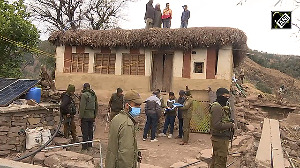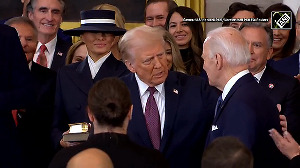Muhammad Yunus proved that he was neither an armchair economist nor a slogan mongering political activist, but a doer destined to do what Mahatma Gandhi said -- to remove every tear from every eye, recalls Rup Narayan Das.

It is heartening that Prime Minister Narendra Modi and Dr Muhammad Yunus, chief advisor to the interim Bangladesh government, spoke with each other and an atmosphere of safety and security of the Hindu minority community in Bangladesh has been assured in the beleaguered nation which is bouncing back to normalcy under the sagacity of its interim leader Dr Yunus.
At a time when the 2006 winner of the Nobel Prize for Peace has been catapulted to the centre stage of geo-politics in the subcontinent and India-Bangladesh relations, rooted in cultural, historical and political congruence, is precariously placed, it is worthwhile to recall the words of wisdom and empathy which he articulated while delivering the second Hiren Mukherjee Memorial Lecture in the central hall of Parliament on December 9, 2009.
The prestigious lecture series was thoughtfully instituted by Somnath Chatterjee, the Speaker of the 14th Lok Sabha. The first lecture was delivered in 2008 by another Nobel Laureate, Professor Amartya Sen.
The dignitaries on the dais and the members of Parliament listened to Dr Yunus with rapt attention that December day. An air of bonhomie, warmth and cordiality permeated the majestic central hall when MPs and other dignitaries congregated to listen to the Nobel Laureate.
After the welcome address by Lok Sabha Speaker Meira Kumar, then vice president Hamid Ansari and then prime minister Dr Manmohan Singh, Dr Yunus traced his transformational journey from a professor of economics to a doer of economics in real life, changing the destiny of people groaning under poverty and hunger through the magic of microcredit finally resulting in the birth of the game changing Grameen Bank.
Recalling the traumatic years of the early 1970s following the liberation of Bangladesh, when his country was passing through the excruciating time of hunger and famine in 1974, he found his class room theories of economics not much of a panacea to redeem hunger and poverty.
The title of his lecture Social Business: A Step Towards Creating A New Economic And Social Order was thoughtful.
Dr Yunus said he got involved with poverty mitigation in 1974 when famine wrought suffering and trauma in Bangladesh; he then decided to quit his teaching job at the university.
In 1974, Dr Yunus said he found it extremely difficult to teach elegant theories of economics in the class room while a terrible famine was raging outside and he suddenly felt the emptiness of economic theories in the face of crushing hunger and poverty.
The inner calling of his heart impelled him to leave the campus and make himself useful to the distressed people of Jobra, the village next door to the university campus.
His outreach to the shanty helped him to know about the people of Jobra, their predicament and helplessness.
He came face to face with the struggle of the people to find the tiniest amount of money needed to support their efforts to eke out a living.
He was shocked to meet a woman who had borrowed just a five taka loan from a money-lender with the condition to sell her products to him at a price he would decide rendering her to a virtual slave.
Such was the poignancy of his lecture.
This led to the founding of the Grameen Bank for poor people.
He proved that he was neither an armchair economist nor a slogan mongering political activist, but a doer destined to do what Mahatma Gandhi said -- to remove every tear from every eye.
In fact his experimentation resonates Gandhi's talisman, which says, 'Whenever you are in doubt, or when the self becomes too much with you, apply the following test. Recall the face of the poorest and the weakest man whom you may have seen, and ask yourself, if the step you contemplate is going to be of any use to him.'
'Will he gain anything by it? Will it restore him to a control over his own life and destiny?'
'In other words, will it lead to Swaraj for the hungry and spiritually starving millions? Then you will find your doubts and yourself melt way.'

Then prime minister Dr Manmohan Singh, then vice president Hamid Ansari and then Lok Sabha Speaker Meira Kumar are also seen. Photograph: Kind courtesy Rup Narayan Das
The seeds of the Grameen Bank was sown in his humble deed when he gave from his own pocket small amounts of money to poor Bangladesh people just to free them from the clutches of money lenders.
He had an uphill task to persuade bank managers to extend small loans to the poor who were not convinced of their credit worthiness.
It was though trials and tribulation that the Grameen Bank was born transforming the life of what the Mahatma called 'Daridranarayan', the poorest of the poor.
Today Grameen Bank has spread into the nooks and corner of Bangladesh and beyond even in the US.
By December 2009, Grameen Bank had 8 million borrowers, 97% of whom were women, and the bank is owned by the borrowers. The members of the bank are elected by the borrowers as shareholders.
At a time when trhe credibility of politicians the world over has eroded to an abysmal level, an apolitical person like Dr Yunus has received so much of spontaneous adulation that people have reposed full faith in him to lead their country.
In Muhammad Yunus, India can see a liberal humanist like Kazi Nazrul and Rabindranath Tagore, two gifted individuals who epitomised the seamless cultural confluence of undivided Bengal of a bygone era.
Dr Yunus can not only steer clear the turbulence in Bangladesh, but also firm up the time tested and trusted between two brethren nations.
Dr Rup Narayan Das is a former senior fellow at the Manohar Parrikar Institute for Defence Studies and Analyses and the Indian Council of Social Science Research. The views expressed are personal.
Feature Presentation: Aslam Hunani/Rediff.com











 © 2025
© 2025